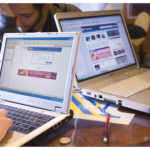
Opening Oct. 19 with a flourish of red, white, and blue sails on the main stage, this year’s Technology and Learning (T+L) conference from the National School Boards Association will focus on “Innovation Delivery,” said NSBA President Earl Rickman. He also announced that this year’s technology conference would be the group’s last.
Reflecting the spirit found in schools across the nation of trying to do more with less, T+L no longer will exist as an annual stand-alone technology conference, Rickman said.
“We’re going to enhance our ed-tech programming,” he said. “We’ll still be around, providing you with the best resources and opportunities, but this is the last year of our [T+L] conference.”
NSBA’s technology conference is going out with a bang this year, as this is the first year that ed-tech vendors in the exhibit hall will have the chance to sell their products directly on the show floor.
All of the conference’s 100-plus sessions will focus on this year’s most pressing ed-tech issues, such as 21st-century classrooms, open-source technology, and science, technology, engineering, and math (STEM) education.
Vendors weren’t the only group highlighted in the opening session, as two school districts were named by NSBA as part of the organization’s yearly ed-tech awards: Liberty County School System in Hinesville, Ga., won the “Technology Leadership Network (TLN) Salute” award, and Township High School District 214 in Arlington Heights, Ill., won the “TLN Trailblazer Award.”
In keeping with the theme of innovation and change, keynote speaker S. Craig Watkins, professor and author of The Young and The Digital, talked to the roughly 1,000 T+L attendees about how to better inspire innovation in the classroom. His advice: Don’t tell today’s “digital natives” to power down.
“In today’s schools, we’re still seeing this notion of asking kids to power down and leave their technology behind. We need technology, when used appropriately and with a good curriculum, to motivate students and bridge their interests to bright futures,” explained Watkins.
Watkins cited a Kaiser Family Foundation study that found kids between the ages of eight and 18 spent an average of seven and a half hours a day with some form of media in 1999. In 2009, kids the same age are spending an average of 11 hours a day with media.
“They’re media multitaskers, and many of them say it’s hard not to be connected. Ninety-eight percent of teens have a personal profile on a social networking site. They’re also not just consumers, they’re creators of content. They truly are digital natives, and we can’t ignore that,” said Watkins.
Watkins gave the example of the Quest to Learn School for digital natives. Here, the school uses game design principles like engagement and motivation to achieve a goal of promoting learning through collaboration, problem solving, and “transmedia navigation,” which is the ability to filter through information.
“The digital tipping point, or the point where kids become immersed in digital media, is starting younger and younger,” he said. “Schools need to embrace technology in a way that becomes a bridge to student motivation.”
- #4: 25 education trends for 2018 - December 26, 2018
- Video of the Week: Dealing with digital distraction in the classroom - February 23, 2018
- Secrets from the library lines: 5 ways schools can boost digital engagement - January 2, 2018


